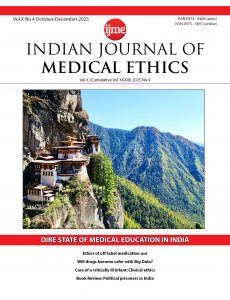
Despite the increase in the number of medical colleges, medical education in India — already beset with low-quality training, shortages of qualified faculty, and growing commercialisation — is once again embroiled in a corruption scandal involving regulatory bodies. An editorial in this issue and a statement of concern from a consortium of healthcare organisations and individual practitioners demand action.
Many survivors of domestic violence hesitate to seek help or report abuse, due to lack of resources besides the associated cultural stigma. A research study analyses hospital records on medicolegal cases and emphasises the need for healthcare practitioners to be proactive in documenting and reporting domestic violence cases.
Two discussions — one on the Israeli medical profession’s failure to uphold ethics amidst the genocide in Gaza, and the other on the off-label use of baclofen for alcohol use disorders — raise contentious points.
Indian prison walls conceal a nightmarish dehumanisation of individuals, particularly those of lower caste and economic status. A commentary critiques a recent Supreme Court judgment on the caste-based exploitation that is embedded in prison manuals, and a book on the impact of prison on political prisoners and their families is reviewed in this issue.
__________________________________________________________________________________________________________Cover credit: The tranquil Tiger’s Nest, Bhutan, high up in the Himalayas, courtesy Dr Anilkumar Patel.
